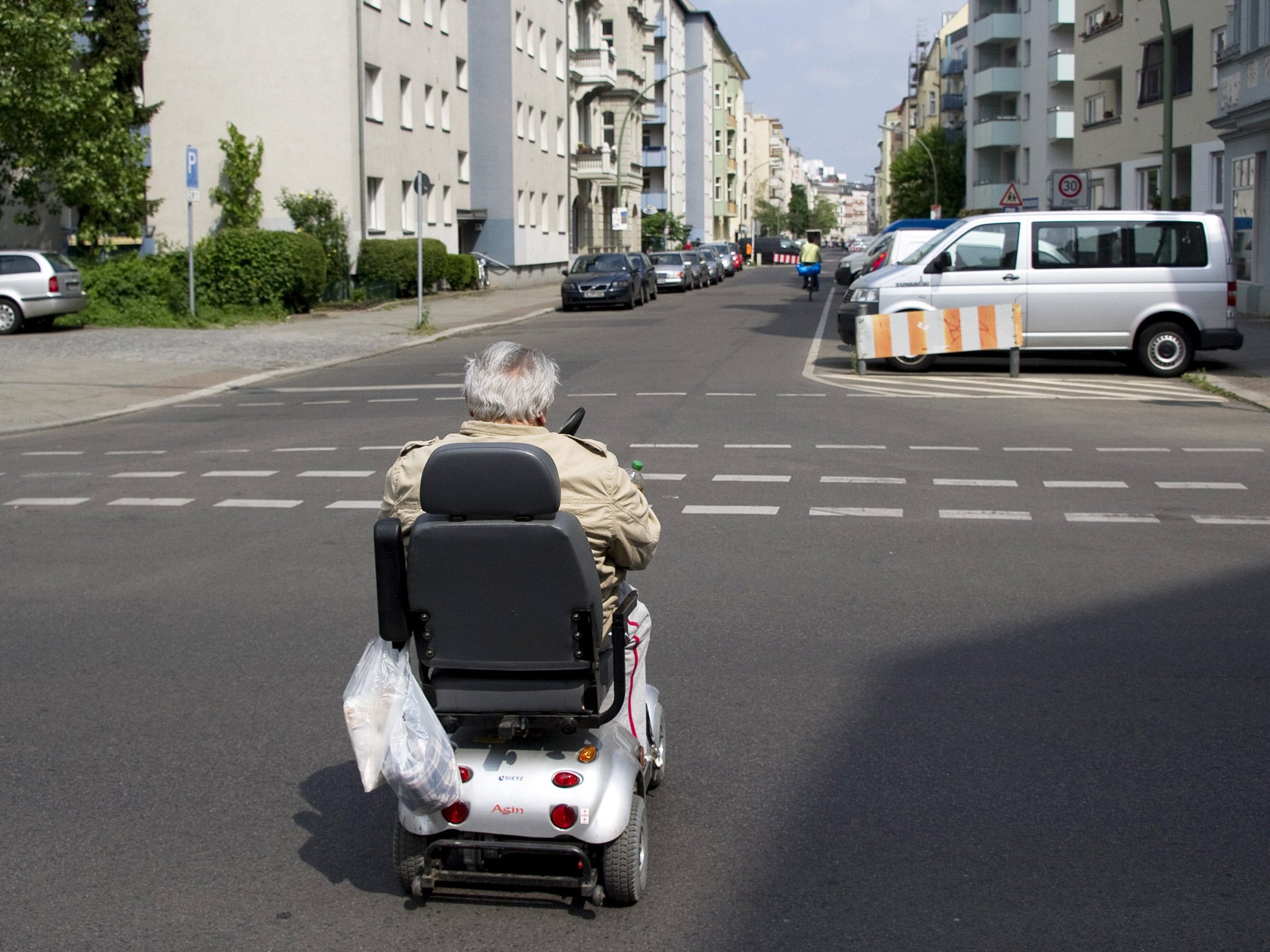Southampton hit-and-run incident is latest example of growing menace of mobility scooters
A 67-year-old man suffered a broken knee and ankle on Monday afternoon

Detectives in Southampton were looking for a driver this week after an incident outside an ice-cream parlour, just down from Roosters Piri-Piri and a branch of Greggs. A 67-year-old suffered a broken knee and ankle after a hit-and-run on Monday afternoon. Yet, as police sought a man in his late 70s with grey hair, the victim could count himself lucky that the vehicle had a maximum speed of 4mph.
The mobility scooter crash, which witnesses said had been deliberate, is the latest of a number of incidents – the majority accidental – involving a rapidly growing, if slow-moving, means of transport. As the population ages, and batteries hold longer charges, thousands of elderly and disabled people have gained a new lease of life. But as reports emerge almost weekly of accidents, calls are growing for legislation to keep up with demand.
"Mobility scooter mayhem" stories have become a staple of local newspapers in many towns and villages. Last March, a grandfather from Newcastle-under-Lyme found himself banned from all branches of Sainsbury's after accidentally running down a fellow shopper at the checkout.
"Anyone over the age of 14 can buy the biggest scooter they can find and go straight out on the road," says John Seamons, a campaigner for scooter safety, who says he writes to the Prime Minister about the issue every week. "No insurance, no testing, no nothing. It's crazy. We had a chap who was walking past the Co-op and a woman hit him at the rate of knots. Poor bloke ended up in hospital and now he has to use a scooter himself."
Seamons became disabled after a car crash in 1990. The former soldier, who is now 67, set up a charity, Scoot-A-Long, which offers guided "rambles" for disabled people, using off-road mobility scooters to explore Dartmoor and beyond. On Friday, a Scoot-A-Long group will roam the Lost Gardens of Heligan in Cornwall. "We have people who haven't been out of their homes in ages," says Seamons, who drove a mobility scooter 5,000 miles around the coast of Britain in 2007, breaking a world record to raise awareness. "When they come back, we give them a pasty and a cup of coffee and the first thing they say is, 'When can we go again?' It's fantastic, but you've got to be safe."
Class two scooters may only be used on pavements and have a top speed of 4mph. Class three machines have a switch for use on the road that allows speeds of 8mph. The faster scooters must be registered with the DVLA, but compliance and enforcement are known to be patchy. They are not taxed, insurance is only recommended, there is no driving test and, while the law states that only people with a medical condition that prevents walking may drive a scooter, Seamons says, "in some places people use them rather than cars because it's cheaper".
The hazy law means mobility scooter stats are scarce. Last year, a report by Rica, a consumer research company, estimated that 80,000 scooters are sold each year, with sales up 10 per cent every year. As many as 350,000 machines are thought to be in use, priced from £400 to £10,000. A survey of almost 500 users revealed that more than half were aged under 65, that 74 per cent could not get around without one, that 60 per cent had received some training and that 20 per cent had been involved in an accident.
As awareness grows of the risk of accidents, demand for insurance is rising. "It's definitely a growing market," says John Garrard, boss of Preston-based Fish Insurance, which specialises in disability insurance. The company recently paid out more than £12,000 after a policyholder injured a shopper in another supermarket incident. Garrard supports calls for legal clarification, but worries that compulsory insurance might increase the cost of access for a demographic that is often poor.
In north London, HTC, a transport social enterprise, runs a Scootability loan scheme, and last year received a record 2000 bookings. Drivers are assessed first. "It's wildly popular with those who use it," says Frank Villeneuve-Smith, a director at HTC. It's the same story in Plymouth, yet Seamons, whose campaign for better safety goes on, warns that his charity will fold if he can't find £8,000 for rent before the end of June. He is fundraising (go to scoot-a-long.org.uk) and hopes to expand if the money can be found. "We want to take people out on fishing boats," he says. "I used to love fishing but I haven't been able to do it since I was disabled."
Subscribe to Independent Premium to bookmark this article
Want to bookmark your favourite articles and stories to read or reference later? Start your Independent Premium subscription today.

Join our commenting forum
Join thought-provoking conversations, follow other Independent readers and see their replies